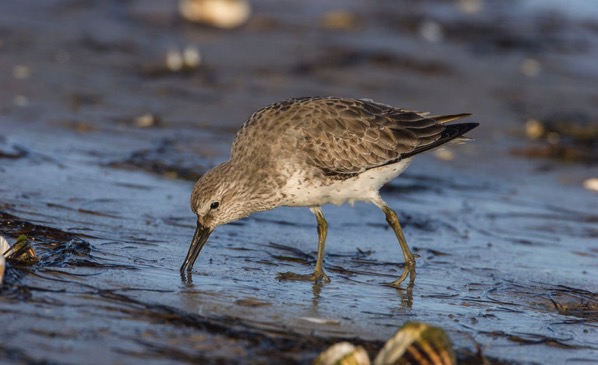The bodies of these shorebirds are actually shrinking, and global warming is the cause
For red knot shorebirds that nest in the Arctic and fly across the globe every year, timing is everything — a matter of life and death.
They nest in the coldest place in the world, feeding bugs to chicks to nourish them for a marathon flight to the tropics when winter approaches. Historically, their departure to tropical beaches and their arrival back to the Arctic after the cold relents were perfectly timed, when plenty of food was available in both areas.
But a new study published Thursday in Science says global warming has changed that. Warming has caused Arctic snow to retreat earlier, causing insect populations that peak as the snow melts to rise and fall before chicks can eat as many as they need to grow and power the grueling flights to come.
As a result, red knots are physically shrinking. And because the smaller birds are weaker, they’re dying off and causing the population to shrink as well.
“Juvenile red knots that we caught along the Baltic Coast while on their way to West Africa were smaller and had shorter bills after warm Arctic summers,” said Jan van Gils, a researcher at the NIOZ Royal Netherlands Institute for Sea Research, who was the study’s lead author.
According to estimates calculated at the turn of the century, red knot numbers have fallen by nearly 60,000, and the threat of extinction is more than real as they continue to drop.

Viral Carpageddon
Australian officials plan to release a carp-specific herpes virus into the country’s waterways in an attempt to wipe out their most troublesome invasive fish.
European carp have ravaged native fish populations since they were introduced by misguided early settlers in 1859.
Because the Cyprinid herpesvirus 3 hasn’t shown any adverse effects in carp-farming countries like China and Vietnam since it first appeared in the late 1990s, officials are confident it will pose no threat to the Australian environment. But they concede that a massive cleanup will be needed when untold millions of fish suddenly die and begin to rot.
The virus kills between 70 and 80 percent of exposed carp within a few weeks.
No comments:
Post a Comment